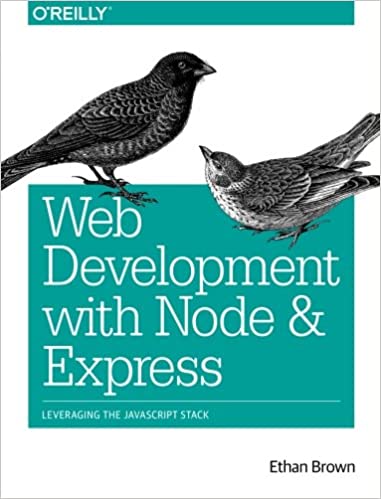; Date: Thu May 28 2020
Tags: Social Media Networks »»»» President Trump »»»»
President Trump is engaging in a multi-front war against mail-in-voting, and on one of those fronts Twitter started adding fact-checking links to Trump's tweets. Today, President Trump responded by issuing an Executive Order that aims to regulate how social media companies moderate the content posted on their networks. We've known all along that Pres. Trump has strong authoritarian tendencies, and this is a clear example of Trump's belief in ruling by dictate.
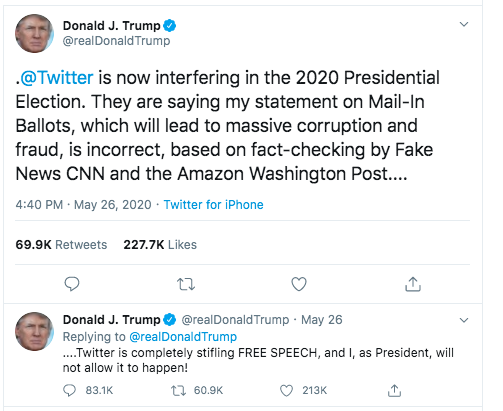
Is today's Executive Order just another knee-jerk Trump Over-reaction to something? A review of the Order shows that it contains too many well thought out plans to have been developed on the spur of the moment. Instead it seems this action had been contemplated for quite some time, and Twitter's fact checking of Trump's tweets simply provided a moment of opportunity.
The issue in question is this pair of tweets:
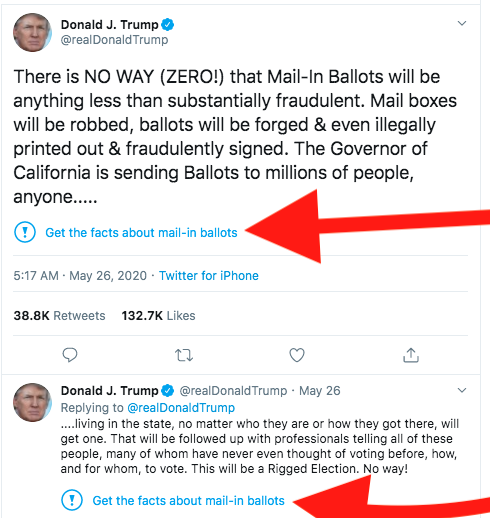
For years Pres. Trump has been tweeting all kinds of crazy unsubstianted things, hate speech, attacks on others, and on and on. Twitter has allowed this to happen even though many are pointing out how often his statements violate Twitters usage policies. Is it appropriate for anyone to post hate speech or attacks on others via Twitter?
In this case Pres. Trump said a clearly untrue thing. California has a long-standing mail-in voting system with many years of experience behind it. Many states in the USA allow mail-in voting, and it is a very positive thing. There is little or no record of fraud via mail-in voting.
These tweets were made as part of a larger campaign against mail-in voting. For a long time Pres. Trump has pushed this false idea that there is rampant voter fraud. Yet the facts are that there are very few cases of voter fraud.
The fact checking link led to a
Twitter Events page headed up by this statement:
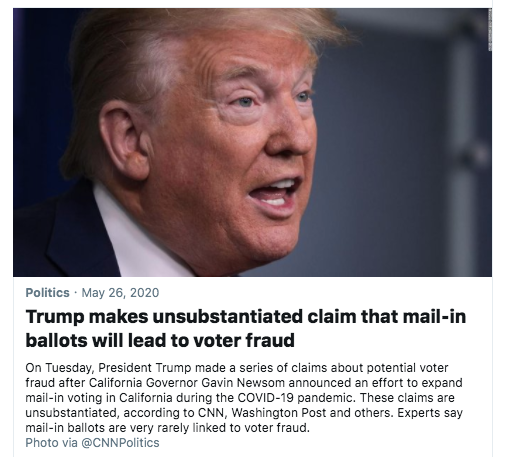
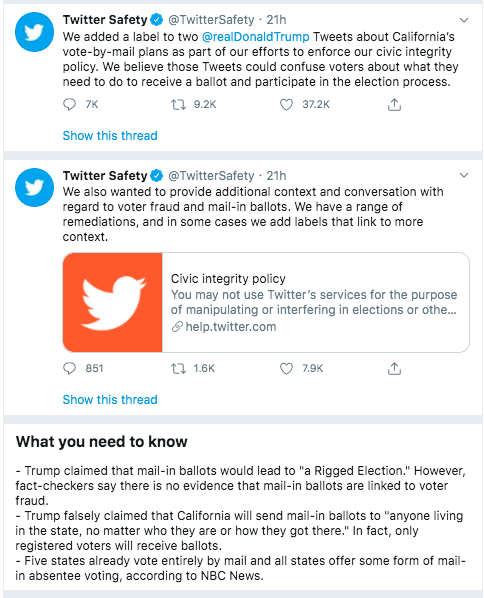
One can understand that someone who was the target of such a statement would feel threatened. Especially when they're someone like Pres. Trump who is well known to be extremely thin-skinned, not taking well to criticism, and quick to angry outbursts and retribution. The tweet shown at the top is an example of an angry outburst promise of retribution, and the "executive order" signed today is an example of retribution in action.
It is believed that Pres. Trump is attacking the practice of mail-in voting because of projections that he will lose the 2020 election. Republicans have, for decades, turned to voter suppression tactics in order to tilt the vote in their favor. It is widely recognized that heavy election turnout tends to favor Democratic Party candidates, leading Republican operatives to limit the ability of people to vote.
As if to demonstrate that Pres. Trump's mind is focusing on the election, consider this:
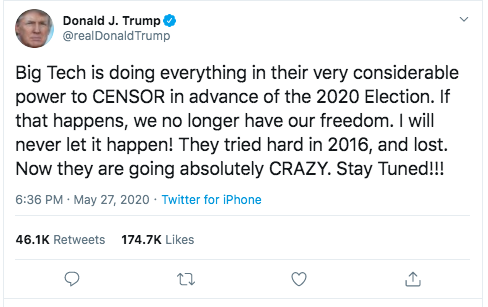
The actual history of the 2016 election is that Trump won on the back of a flood of fake information posted to Twitter, Facebook and elsewhere. That this happened is well known and well recognized.
The action taken against Twitter et all must have been planned well in advance
The Executive Order (see the next section) is being presented as a knee-jerk reaction against the events outlined above. That is, Trump Tweeted, Twitter responded with fact checking, and Trump responded with a rage induced Executive Order.
The Executive Order contains many actions that must have required months or years to develop. In fact, it is known that the Trump Administration has been edging towards this action for a long time. Many in the Conservative Punditry have been building a case against Twitter et al, using phrases like shadow banning and the like claiming that Twitter et al is engaging in heavily slanted censorship.
See:
- Rep. McCarthy was not shadow banned, his Twitter account was misconfigured to hide postings
- What is Shadow Banning? Banning a member such that they do not know they're banned
- Pres. Trump slams move to ban hate-speech mongerers like Alex Jones
In truth, many of those same folks have engaged in hate speech, and often are being pushed from Twitter et al because of hate speech policies.
The action taken against Twitter et al
The
Executive Order (titled Executive Order on Preventing Online Censorship) is a general broadside aimed at Social Media Networks which the Order portrays as engaging in censorship of freedom of speech.
In Sec. 2. Protections Against Online Censorship. the Order gets into a touchy area for owners of online discussion platforms.
What happens to an online discussion platform where a user of that platform posts something that is flagrantly violating the law? For example, posts child pornography? Is that posting of illegal content protected by free speech? Or, is the owner of that platform liable for prosecution because a user posted an illegal something-or-other?
For those of us who own online discussion platforms, this is a very important question. I own a site (
visforvoltage.org) just like thousands of others are small time operators of such discussion forum sites. I do not have the deep pockets of companies like Facebook to fend off lawsuits. If a user of my site posted an illegal thing, and I did not catch that thing, am I liable as the owner of that site for what this other person did?
But, expand this problem to the size of the user base of Twitter or Facebook. The number of accounts is in the billions, the number of postings per day is surely in the trillions, and how is Twitter or Facebook to be responsible for all that?
The Executive Order discusses section 230(c) of the Communications Decency Act which the Order describes as so:
Section 230(c) was designed to address early court decisions holding that, if an online platform restricted access to some content posted by others, it would thereby become a “publisher” of all the content posted on its site for purposes of torts such as defamation. As the title of section 230(c) makes clear, the provision provides limited liability “protection” to a provider of an interactive computer service (such as an online platform) that engages in “‘Good Samaritan’ blocking” of harmful content. In particular, the Congress sought to provide protections for online platforms that attempted to protect minors from harmful content and intended to ensure that such providers would not be discouraged from taking down harmful material. The provision was also intended to further the express vision of the Congress that the internet is a “forum for a true diversity of political discourse.” 47 U.S.C. 230(a)(3). The limited protections provided by the statute should be construed with these purposes in mind.
My understanding is that, as the operator of such a site, my responsibility is to remove harmful content but otherwise to leave the free flow of discussion as it goes. And that is my policy as the owner of an online discussion forum.
Of course the big question is whether Facebook, Twitter, et al, are indeed acting appropriately or whether they are overstepping what they should be doing. However, it is within their roles and responsibilities to moderate the postings on the platforms.
It's known that the Conservative Punditry have been working for some time building up a sense that Twitter et al is run by a bunch of liberal hippies in Silicon Valley, that hate Conservatives, and are looking to stifle Conservatives. Never mind that there are just as many Liberals complaining about closed accounts and censorship as the Conservatives.
Section 230 was not intended to allow a handful of companies to grow into titans controlling vital avenues for our national discourse under the guise of promoting open forums for debate, and then to provide those behemoths blanket immunity when they use their power to censor content and silence viewpoints that they dislike. When an interactive computer service provider removes or restricts access to content and its actions do not meet the criteria of subparagraph (c)(2)(A), it is engaged in editorial conduct.
This is an actual concern, and I fully agree with this concern.
The companies in question - Facebook, Twitter, etc - have developed their businesses to a size where their platforms are used as the discussion medium between everyone. The policies these companies follow shapes the discussion, and what people say to each other. We should all be concerned whether those companies are acting to purposely tilt our discussions in one way or another.
But we also have to remember that the Trump Administration was elected on the back of a flagrant manipulation of online discussions. The manipulation was created by operatives associated with the Russian government. What is the Trump Administration actually getting at?
Proposal for the FCC to create regulations
(b) To advance the policy described in subsection (a) of this section, all executive departments and agencies should ensure that their application of section 230(c) properly reflects the narrow purpose of the section and take all appropriate actions in this regard. In addition, within 60 days of the date of this order, the Secretary of Commerce (Secretary), in consultation with the Attorney General, and acting through the National Telecommunications and Information Administration (NTIA), shall file a petition for rulemaking with the Federal Communications Commission (FCC) requesting that the FCC expeditiously propose regulations
This paragraph talks about the policy statements stated previously in the document, and calls on Federal Government Agencies to take action. In particular the Commerce Department, through the FCC etc, is called to start a Rule-Making proceeding aimed at these goals:
- Clarifying the circumstances under which a provider of an interactive computer service that restricts access to content in a manner not specifically protected might instead not be able to claim protection.
- the conditions under which an action restricting access to or availability of material is not “taken in good faith”
- any other proposed regulations that the NTIA concludes may be appropriate to advance the policy described in subsection (a) of this section.
In other words, the goal is to put the pressure on social media networks.
Limiting advertising dollars spent on social media networks by Federal Agencies
In Sec. 3. Protecting Federal Taxpayer Dollars from Financing Online Platforms That Restrict Free Speech. every Agency of the Federal government is requested to review its ad spending on social media networks.
Federal review by the FTC of complaints against Twitter et al
In Sec. 4. Federal Review of Unfair or Deceptive Acts or Practices. the Order talks about a so-called Tech Bias Reporting tool that the White House launched. It's claimed that within weeks it received over 16,000 complaints of censorship by social media networks.
The Order goes on to call on the FTC to investigate complaints against the social media networks.
State level review of social media networks
In Sec. 5. State Review of Unfair or Deceptive Acts or Practices and Anti-Discrimination Laws. the Order calls on the US Attorney General to convene a working group of all Attorneys General across the USA to:
regarding the potential enforcement of State statutes that prohibit online platforms from engaging in unfair or deceptive acts or practices. The working group shall also develop model legislation for consideration by legislatures in States where existing statutes do not protect Americans from such unfair and deceptive acts and practices. The working group shall invite State Attorneys General for discussion and consultation, as appropriate and consistent with applicable law.
Further, in Sec. 6. Legislation. the Order calls on the US Attorney General to develop a proposal for Federal legislation that would be useful to promote the policy objectives of this order.




